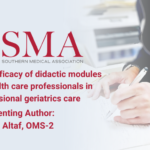Abstract | November 13, 2020
Assessing the efficacy of didactic modules in training health care professionals in interprofessional geriatrics care
Learning Objectives
- Educate health care professionals-residents and fellows on promoting geriatrics competencies.
- Educate health care professionals- residents and fellows on awareness of social determinants of health.
- Educate health care professionals- residents and fellows on person-centered care in age-friendly health systems.
Background: The population of Americans aged 65 years or older will account for roughly 20% of the U.S. population by 2030. According to the National Council on Aging, roughly 80% of older adults have at least one chronic disease, such as hypertension, cardiovascular disease, and diabetes. Florida is the third most populous state in the U.S., behind California and Texas. According to the American Geriatrics Society’s Geriatrics Workforce Policy Studies Center as of 2016, the U.S. overall had a shortfall of more than 13,000 geriatricians. Given the impossibility of engaging and training a sufficient number of geriatricians to meet the growing and evolving needs of older adults, it is critical for primary care professionals, residents, and students from all health care disciplines to be trained in interprofessional geriatric care to meet current and emerging needs.
Method: Nova Southeastern Geriatric Workforce Education Program provided didactic training modules to the Site 1 and Site 2 primary care professionals, residents, and students. The objective was to build competencies to ensure that all providers have the knowledge and skills to provide care for older adults with chronic illnesses using didactic training in several topics. Pre-Post data was collected through REDCapTM, a mature, secure web application for building and managing online surveys and databases.
Results: Diabetes Module: After the didactic module, the percentage of healthcare professionals with high knowledge of the topic improved from 0% to 41.6% at site 1 and from 19.2% to 46.2% at site 2. Cardiac Failure Module: After the didactic module, the percentage of healthcare professionals with high knowledge of the topic improved from 9% to 36.4% at site 1 and from 12% to 50% at site 2. Oral Health Module: After the didactic module, the percentage of healthcare professionals with high knowledge of the topic improved from 20% to 60% at site 1 and from 3% to 25% at site 2.
Conclusion: Feedback from the didactic training indicated improvement in the knowledge of the participants, suggesting a sustainable training program on geriatric issues.

